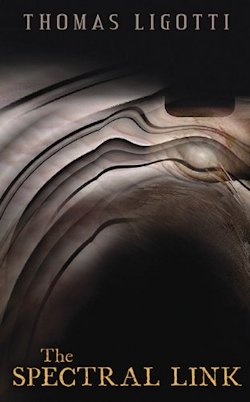An anachronism in an age when authors are expected to be out there, selling themselves every second, Thomas Ligotti has never been particularly prolific, however he did, for a period of years, publish new short stories on a semi-regular schedule, every one of which represented an event among enthusiasts of his existential efforts.
Then, a decade or so ago, Ligotti was laid up with a crippling case of writer’s block. Perniciously, this persisted until 2012, when a near-death experience moved him to pick up his pen again. The Spectral Link is the result: a slender collection of novelettes that is no less essential for its relative brevity.
In ‘Metaphysica Morum,’ the descendent of “degenerate swamp dwellers” documents his desire to die. Feeling left behind in life, and utterly unable to relate to reality, our unnamed narrator dreams of release, but cannot bring himself to do the deed.
To that end, he attends the clinic of an obviously dodgy doctor, who has arranged for him a home, and employment, also—the better to pay for his regular sessions. No amount of therapy has helped him, however; indeed, this “metaphysical mutant” seems set against getting better. He wants nothing more than “to be euthanised by anesthesia,” and in advance of that, the only guidance he heeds is rooted in the unreal, namely his nightmares:
There were instructions of intent, infinitely complex processes and principles at work, manifestations that were singular and manifold at once, particular and universal, arbitrary and absolute, all of which were correlated in way both infinitesimal and immeasurable within my nature. As is common in dreams of affairs beyond sensible conception, which I had experienced all my life and over the years refined into the formulations here articulated, I was overwhelmed by an uncanny dread.
“This autobiographical confession or complaint” is uncomfortable, and slow to get going—I found much of it almost intolerably tedious—but ‘Metaphysica Morum’ packs a powerful punch when we finally realise what we’ve been reading: a roundabout sort of suicide note.
Considered alongside Ligotti’s earlier efforts, the second story in The Spectral Link is markedly more conventional than the first, and substantially more satisfying. “I know my lines,” its narrator (again unnamed) notes. “I’ve told this story before, as you know. And I do want it to be good this time.” It is. ‘The Small People’ is the explanation of a boy who hates—a “shameful little bigot,” in the parlance of his parents, sickened by the small people’s presence:
Certainly my disposition was not in line with that of the larger share of humanity. In good faith, I have to admit as much, Doctor. I know you must be aware of the torment an individual suffers when he begins to wonder if he is the one on the wrong side of reality.
Eventually his hatred gives way to a crawling curiosity, ill-sated by a day in the local library, because “where the small people were concerned, there was nearly a blackout of intelligence.” So stymied, he and a friend with related reservations sneak into small country one night, where they witness something unspeakable:
The intrusion of an unnatural colony of beings into the anatomy of our world—not a different race or group, but something that did not belong, neither here nor anywhere conceivable by human senses or cognition. It was something unknown that had taken form, or was in the process of taking form, coming of age in a world it was displacing. That night with my friend brought so many thing home to me. A new phase in my sentiment toward the small had begun fermenting within my being. […] Fear had now gotten the better of both hatred and curiosity.
The manifestation of his fear is followed, in short order, by something awful; something foreshadowed by the form of ‘The Small People’ as an address to a doctor, indeed.
While ‘Metaphysica Morum’ mightn’t be among the finest fictions Ligotti has written, “the disorienting unreality of the situation” the author suggests in ‘The Small People’ is so intensely distressing that this story alone makes The Spectral Link unmissable. As an exploration of that tenuous connection which joins us and the other, it knows no equal.
The Spectral Link is available June 30th from Subterranean Press.
Niall Alexander is an extra-curricular English teacher who reads and writes about all things weird and wonderful for The Speculative Scotsman, Strange Horizons, and Tor.com. He’s been known to tweet, twoo.










